Borussia Mönchengladbach
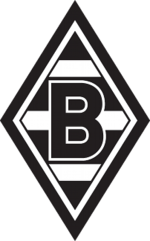 |
|||
| Full name | Borussia VfL 1900 Mönchengladbach e.V. |
||
|---|---|---|---|
| Nickname(s) | Die Fohlen (the Foals) | ||
| Founded | 1 August 1900 | ||
| Ground | Borussia-Park, Mönchengladbach (Capacity: 54,067) |
||
| President | |||
| Manager | |||
| League | Bundesliga | ||
| 2009–10 | Bundesliga, 12th | ||
|
|||
Borussia Mönchengladbach (German pronunciation: [boˈʁʊsi̯a ˌmœnçənˈɡlatbax]) is a German football club based in Mönchengladbach, North Rhine-Westphalia. The team plays in the first division 1. Bundesliga and is one of the country's most well-known, best-supported, and successful teams. Borussia Mönchengladbach has over 40,000 members and is the sixth largest club in Germany.[1] The official mascot of the club is the foal Jünter. "Borussia" is a Latinized form of Prussia, a popular term in naming German clubs located within the former Kingdom of Prussia.
Contents |
History
Early history
The club's forerunner was a loose association of young men known as Fussball Club Germania München-Gladbach from the city's Eicken district organized in late 1899. FC Borussia M.Gladbach was formally established on August 1, 1900 and took up play in the Rheinisch-Westfälischen Spielverband.
The new club made steady progress, moving upward through the different levels of league play and in 1912 appeared in the final of the Westdeutsche Verbandsliga, losing 2:4 to Kölner BC. In 1919, they joined Turnverein Germania 1889 to form Verein für Turn- und Rasensport 1889 München-Gladbach. The next year VfTuR made a second appearance in the final against Kölner BC, this time coming away with a 3:2 overtime victory. The next month they played their first game in a national championship playoffs, but did poorly, losing 0:7 to SpVgg Fürth in the opening round. In 1921, the footballers decided to leave Germania's gymnasts behind to form Borussia VfL München-Gladbach.
In 1933 the club formed a short-lived union with SC München-Gladbach to play as SC Borussia München-Gladbach until August 1934. SC Borussia qualified to play in the Gauliga Niederrhein, one of sixteen top-flight divisions established in 1933 in the re-organization of German football under the Third Reich. They played two more season at that level as VfL before being relegated to lower tier competition until moving up to the Oberliga West in 1952.
Ascent to the Bundesliga
In 1960 the club won its first major honours when they beat Karlsruher SC 3:2 in the final of the German Cup and the following year took on the now familiar name Borussia VfL Mönchengladbach. Further honours would be another decade in coming. Borussia's results in the ten years leading up to the formation of the Bundesliga in 1963 were not good enough to earn them admission into the ranks of the nation's new top flight professional league and so they played in the second tier Regionalliga West.
Mönchengladbach played their way into the Bundesliga in the 1965-66 season, alongside future powerhouse Bayern Munich. These two clubs would go on to a fierce struggle as they challenged each other for league supremacy throughout the 1970s. Bayern counted first, winning the Bundesliga championship in 1969. M'gladbach struck back immediately in the next season with a championship of their own and followed up with another one in 1971, becoming the first Bundesliga club ever to successfully defend their title.
Borussia's Golden Decade
Bayern then became the first club to win three consecutive titles with Borussia finishing only a point behind the champions in 1974. Die Fohlen were able to take some consolation in a 2:1 victory over 1. FC Köln in 1973 to win their second German Cup. Under coach Hennes Weisweiler the young side displayed an offensive minded philosophy and powerful play that attracted fans from all over Germany. The team stayed on the attack and matched Bayern's achievement with three consecutive titles of their own from 1975 to 1977. M'gladbach lost the 1977 final of the European Cup to Liverpool, but also made four appearances in the UEFA Cup with wins in 1975 and 1979 against losses in 1973 and 1980. The club's spectacular run had come to an end with eight titles to their credit. And although they would continue to be competitive for many years, success would be much harder to come by.
1980 and Beyond
Mönchengladbach's golden era ended in the 80's as the club had to sell many of its best players to keep its finances in order, and without talented coaches like Hennes Weisweiler and Udo Lattek it was not possible to stay on top. Even so, they managed to finish most seasons in the upper half of the league table and, in 1984, they were part of a four way race to the Bundesliga championship, finishing one point ahead of Bayern, and tied on points with Hamburg and champions Stuttgart, but behind on goal differential. That same season M'gladbach lost the German Cup final to Bayern on penalties.
The team's performance slipped significantly in the 90's and they found themselves struggling in the lower half of the Bundesliga table. They lost another German Cup on penalties – this time to Hanover – before winning their last honours to date with a 3-0 Cup win over Wolfsburg in 1995. Finally, in 1999, they were relegated to 2.Bundesliga where they would spend two seasons. The club's return performance in the Bundesliga was uninspired as they remained mired in the bottom half of the league.
In 2004, M'Gladbach m;'m;Dick Advocaat, who had guided the Dutch national team to the semi-finals of the Euro 2004 tournament and was a successful manager at Rangers, as their new coach. He was unable to turn the team's fortunes and resigned in April the next year. Former Mönchengladbach player and German international Horst Köppel was appointed caretaker for the remaining five fixtures of the season. Köppel had managed the club's reserves since leaving Borussia Dortmund in June 2004. For the 2006/2007 season legendary Mönchengladbach player and coach Jupp Heynckes was appointed as team coach.
Borussia has taken steps to improve their financial situation with the construction of a new state-of-the-art stadium called Borussia-Park with a permitted capacity of 59,771 spectators (limited to 54,067 for Bundesliga games and to 46,249 for international games). The club had long been hindered by playing in a much smaller and older facility (Bökelberg, capacity 34,500) and with the opening of the new stadium in 2004 can look forward to increased revenues through higher ticket sales and the ability to host lucrative international matches.
On the 31st matchday of the 2006/2007 season Borussia Mönchengladbach were relegated from the Bundesliga after Arminia Bielefeld upset Werder Bremen 3-2 while Borussia lost 1-0 at home to VfB Stuttgart.
They were promoted back to the Bundesliga on the 32nd matchday of the 2007/2008 season after winning the match vs. SV Wehen 3-0.
Off the pitch, the fans have developed a bond with fans of Liverpool FC, having played against each other in a Uefa Cup final and a European Cup final in the 1970's. It is a friendship that is developing every year with supporters of Liverpool FC travelling to Borussia Monchengladbach annually and vice-versa. After the Hillsborough disaster, fans of Borussia Monchengladbach donated a large sum of money for the Hillsborough fund. They also provided the opposition for Emlyn Hughes' Testimonial game at Anfield. Many "Borussen" wear Liverpool shirts and scarves in the "Nordkurve" (the BMG Kop) during home games.
Manager history
|
|
Players
For recent transfers, see List of German football transfers summer 2010 and List of German football transfers winter 2009–10.
Current squad
Note: Flags indicate national team as has been defined under FIFA eligibility rules. Players may hold more than one non-FIFA nationality.
|
|
Honours
Borussia Mönchengladbach's five Bundesliga championships entitle the club to display two gold stars of the "Verdiente Meistervereine".
National
Bundesliga:
-
- Winners (5): 1969–70, 1970–71, 1974–75, 1975–76, 1976–77
- Runners-up (2): 1973–74, 1977–78
-
- Winners (3): 1959–60, 1972–73, 1994–95
- Runners-up (2): 1991–92, 1983–84
German Supercup:
-
- Winners (1): 1977 (Unofficial)
- Runners-up (1): 1995
European
-
- Runners-up (1): 1977
-
- Winners (2): 1975, 1979
- Runners-up (2): 1973, 1980
International
-
- Runners-up (1): 1977
Kirin Cup:
-
- Winners (1): 1978 (Shared with SE Palmeiras)
Other Trophies
Joan Gamper Trophy:
-
- Winners (1): 1972
Orange Trophy:
-
- Winners (1): 1977
Youth
German Under 17 Champions:
-
- Winners (1): 1981
- Under 17 Bundesliga West
- Winners (1): 2009
Records
Borussia Mönchengladbach's name is attached to a number of Bundesliga records:
-
- Mönchengladbach has a fearsome record when it comes to laying a drubbing on other teams. On April 29, 1978 they beat Borussia Dortmund (12:0), the biggest winning margin ever in league history, as well as the most goals scored by a single side in a match. The Dortmund coach, Otto Rehhagel, was not only immediately fired after the game, he also got the nickname "Torhagel" ("Goal hail"). They also hold second place in the category for beating Schalke 04 (11:0) on January 7, 1967, and third place for a pair of (10:0) victories over Eintracht Braunschweig on November 11, 1984 and Borussia Neunkirchen on November 4, 1967.
-
- The most penalties in a match is 5 in a game played between M'gladbach and Dortmund on November 9, 1965.
- In 1961, Borussia became the first German side in the Cup Winners' Cup. However, they were defeated by Rangers F.C. of Glasgow in the quarterfinals with losses of 0-3 and 0-8. The quarterfinals were the first round then.
- On 20 October 1971 Borussia Mönchengladbach won 7:1 vs Inter Milan. Fortunately for Inter, an empty Coca-Cola tin can was thrown at Inter striker Roberto Boninsegna, who collapsed to the ground, supposedly hit by that tin (“Büchsenwurf vom Bökelberg”). Inter launched a protest against the result and the UEFA granted a re-match to be staged in Germany with Berlin's Olympiastadion chosen, which ended in a goalless draw.
Players' honours
For a list of every Borussia Mönchengladbach player with 50 or more appearances, see List of Borussia Mönchengladbach players
Players of the club achieved the following honours:
Player of the Year - Europe
- 1977:
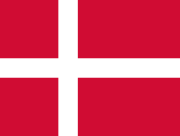 Allan Simonsen
Allan Simonsen - 1986:
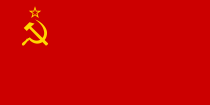 Igor Belanov
Igor Belanov
Player of the Year - Germany
- 1971:
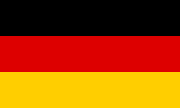 Berti Vogts
Berti Vogts - 1972:
 Günter Netzer
Günter Netzer - 1973:
 Günter Netzer
Günter Netzer - 1979:
 Berti Vogts
Berti Vogts - 1987:
 Uwe Rahn
Uwe Rahn - 1990:
 Lothar Matthäus
Lothar Matthäus - 1999:
 Lothar Matthäus
Lothar Matthäus
Player of the Year - Australia
- 1996:
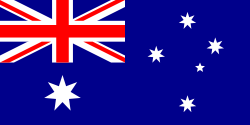 Damian Mori
Damian Mori
Player of the Year - Austria
- 1986:
 Anton Polster
Anton Polster - 1997:
 Anton Polster
Anton Polster
Player of the Year - Belgium
- 2001:
.svg.png) Wesley Sonck
Wesley Sonck
Player of the Year - Denmark
- 1994:
 Thomas Helveg
Thomas Helveg
Player of the Year - Sweden
- 1993:
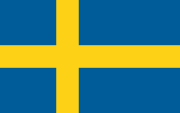 Martin Dahlin
Martin Dahlin - 1995:
 Patrik Andersson
Patrik Andersson - 2001:
 Patrik Andersson
Patrik Andersson
Player of the Year - USA
- 1997:
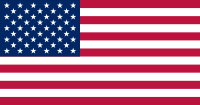 Kasey Keller
Kasey Keller - 1999:
 Kasey Keller
Kasey Keller - 2005:
 Kasey Keller
Kasey Keller
Bundesliga Top-Scorers
- 1974 - 30 Goals -
 Jupp Heynckes (jointly with Gerd Müller (FC Bayern München))
Jupp Heynckes (jointly with Gerd Müller (FC Bayern München)) - 1975 - 29 Goals -
 Jupp Heynckes
Jupp Heynckes - 1987 - 24 Goals -
 Uwe Rahn
Uwe Rahn - 1995 - 20 Goals -
 Heiko Herrlich (jointly with Mario Basler (Werder Bremen))
Heiko Herrlich (jointly with Mario Basler (Werder Bremen))
Goal of the Year
- 1971:
 Ulrik Le Fevre
Ulrik Le Fevre - 1972:
 Günter Netzer
Günter Netzer - 1973:
 Günter Netzer
Günter Netzer - 1978:
 Rainer Bonhof
Rainer Bonhof - 1979:
 Harald Nickel
Harald Nickel - 2005:
 Kasper Bögelund
Kasper Bögelund - 2006:
 Oliver Neuville
Oliver Neuville
References
- ↑ Members Borussia Mönchengladbach (in German)
- ↑ "Borussias Trainer" (in German). borussia.de. http://www.borussia.de/de/trainer,74,0.html.
Literature
- Holger Jenrich: Das Borussia Mönchengladbach Lexikon. Verlag Die Werkstatt, Göttingen 13 February 2011, ISBN 3-89533-585-1.
- Holger Jenrich, Markus Aretz: Die Elf vom Niederrhein. 40 Jahre Borussia Mönchengladbach in der Bundesliga. Verlag Die Werkstatt, Göttingen 13 February 2011, ISBN 3-89533-503-7.
- Werner Jakobs, Rainer Kalb, Markus Aretz: 100 Jahre Borussia Mönchengladbach - Die Borussen-Chronik. Verlag Rheinsport networking, Düsseldorf 13 February 2011, ISBN 3-93470-200-7.
- Helmut Grashoff, Susanne Grashoff: Meine launische Diva: 30 Jahre mit Borussia Mönchengladbach. Radtke & Bahr GbR, Norderstedt 13 February 2011, ISBN 3-00016-918-0.
- Markus Aretz, Ingo Rütten: Akte Aufstieg: Borussias Tagebuch der Saison 2007/08. Verlag Die Werkstatt, Göttingen 13 February 2011, ISBN 3-89533-626-2.
External links
- Official team site in German and English
- fohlen-hautnah.de Supporter Magazine in German
- Seitenwahl.de Supporter Magazine in German
- The Abseits Guide to German Soccer
- Borussia-Park the team's new stadium
- Tactics and LineUps
- Monchengladbach statistics
- FohlenKommando
- Torfabrik
|
|||||||||||
|
||||||||
|
|||||
|
|||||
|
|||||